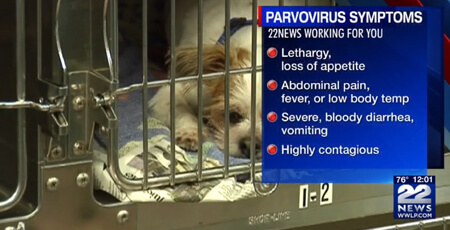Vaccine is best prevention against canine parvovirus
“They can get very sick very fast,” said Dr. Jennifer Johnson of Second Chance Animal Services.
In the past two weeks, there have been three reported cases in Springfield, and one was deadly.
Second Chance Animal Service told 22News that a puppy seen at the Community Veterinary Hospital on Mulberry Street tested positive for parvovirus on Tuesday. Sadly, the puppy died shortly after the vet visit.
A dog can pick up parvovirus through direct contact with an infected dog or contaminated object.
“Parvo can also be brought into the house by the soles of your feet,” explained Julie Sullivan of Second Chance. “It can be on your shoes if you’re going to a dog park, or walking on the sidewalk and step in feces. Then, it can be brought into your home.”
Symptoms include lethargy, vomiting, diarrhea with blood, or weight loss. It mostly affects unvaccinated dogs and young puppies. If you plan on taking your puppy to a dog park or another public place, you’ll want to make sure they are vaccinated for parvovirus first.
“We just want to make sure that puppies get their initial vaccine between six and eight weeks of age,” said Dr. Johnson. “Then, it needs to be boostered every three to four weeks until they are 16 weeks old. After that, they get a booster at one year, and then adult dogs will get boostered every one to three years.”
Dr. Johnson told 22News, that parvovirus is almost completely preventable with this vaccine. If you don’t know if your dog has been vaccinated, you can always take it to the vet for another shot – it won’t hurt them.
Second Chance offers a walk in vaccination clinic every Tuesday from 9 a.m. – 11 a.m. A parvo shot is $12.

